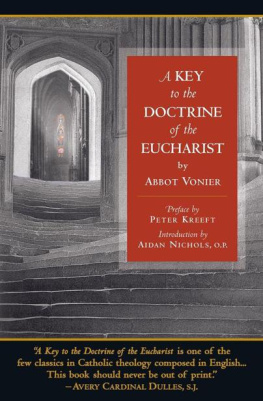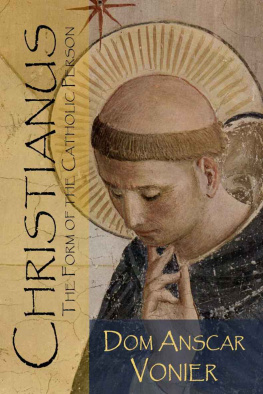THE VICTORY OF CHRIST
BY
DOM ANSCAR VONIER, O.S.B.
ABBOT OF BUCKFAST
Assumption Press
2013
Nihil Obstat.
Georgius D. Smith, S.Th.M., Censor Deputatus .
Imprimatur.
Joseph Butt, Vicarius Generalis
Westminster
July 9, 1934
The Nihil Obstat and Imprimatur are official declarations that a book or pamphlet is free of doctrinal or moral error. No implication is contained therein that those who have granted the Nihil Obstat and the Imprimatur agree with the content, opinions or statements expressed.
This book was originally published in 1934 by Burns, Oates, and Washbourne.
Copyright 2013 Assumption Press.
Cover image: Polyptych of the Resurrection , Detail , Titian, 1520-22
Contents
Foreword
Much has been written by the defenders of the Faith on the profound and far-reaching changes brought about in the human race through the advent of Christianity. Again it is a subject beloved of the apologists of Catholicism to show how the Church has triumphed over and over again, and has come out victorious from the fiercest conflicts. In a more restricted field of observation hagiographers have been able to set forth the power of divine grace in the hearts of individual men and women. The idea of a spiritual victory is the leading motive in such presentments of the history of the Church; it is a victory that is observable and that can be made the theme of any historiographer who has an eye for the great realities of the Christian faith.
The book which is now given to the public is not a work of apologetics but of theology. The victory of Christ of which it treats is entirely a matter of faith; it is another aspect of redemption, and redemption is, of course, known only to faith. I have therefore chosen the more difficult part, as theology is less accessible to the ordinary mind than apologetics. I am encouraged, however, in selecting this difficult dogma by the thought that many a soul may be rendered happy by an increase of the knowledge of Christs marvelous work and more courageous through an increase of the understanding of Christs power over evil. To show the extent of that power is the main scope of this volume, and I am convinced that there is hardly a subject of Christian doctrine so appropriate to the needs of our day as the revealed truths concerning the defeat of the empire of darkness by Christ the King.
ANSCAR VONIER, O.S.B.,
Buckfast, Abbot.
Easter, 1934.
I
The Mystery of Christs Glorification
T he victory of Christ is an integral part of the mystery of the glorification of Christ; it is that portion of it which has to do with the overcoming of obstacles. We ought therefore to begin by laying down the general principles that guide our faith in Christs permanent exaltation.
The glorification of Jesus Christ is truly a mystery, that is to say, a truth and a fact greater than the mind of man can encompass. Like all other mysteries connected with the Incarnation it is incomprehensible both in itself and in its setting. The fact that One who not so long ago nineteen centuries are a short period walked on this earth, in all things resembling man, should now be in that state which is described as sitting at the Right Hand of God is, of course, beyond human comprehension, for the exaltation is an infinite reality, not a finite one.
Then the other aspect, the setting of the mystery, is in itself a problem that defies all human anticipation or parallel. The setting of the exaltation is the debased humanity from which Christ sprang, according to the flesh. It is true that Christ is raised above all names that are mentioned in this world or the next, but being exalted, He has not left humanity behind, He has not shed it, He has not cast it away, b ut He has retained all His connections with it. Humanity is truly the setting of the mystery of Christs elevation as it is the setting, for example, of the Eucharist.
Now I say that this is a fact that baffles us, but which we have to accept as containing in itself no contradiction, that humanity should apparently remain so unelevated when its Head, Christ, is surrounded with infinite glory. This is, of course, no greater problem than the coexistence of God and evil, or the simultaneous realities of Gods omnipotence and mans abuse of the free will which the Creator has given. Christianity is a series of such coexistences of diametrically opposite states, and we must accustom our minds not to think less well of the holy reality because the unholy one is by the side of it.
So Christ s glorification is for us the supreme reality which we see everywhere; it is not diminished through any denial of that splendor by the world; we know that Christ is in the glory of the Father. Our Lords glorification is essentially to be conceived in terms of happiness for Himself. Through glorification He possesses in His humanity all that bliss which is due to Him in virtue of His being united hypostatically with Godhead. Whilst on earth much of that happiness was withheld from Christs humanity how much we have no means of knowing. Now, there is no possible check to the inundating gladness of the Divinity. He is as happy in His soul and body as is conceivably possible. Any sadness or pain now would be a contradiction of His state as the Son sitting at the Right Hand of the Father.
Christians here on earth may represent to themselves Christ as being a sufferer in soul and body. They may do this as a remembrance of all He endured during His earthly life. The sufferings of Christ may be said to haunt the mind of the Church, so viv id and so present is their memory. Christians may even think of Christ in the present as being the One whose Name is blasphemed and persecuted, whose love is unrepaid and forsaken. The sorrow for this ill-will on the part of the men with whom we live may inspire sentiments in the faithful towards Christ very near to sympathy as for one who is bruised and neglected. The mystical sense of the Catholic enables him to feel all those things as if Christ were suffering in him and he in Christ. But it is, of course, beyond all doubt that in Himself, in His self-subsisting personality at the Right Hand of the Almighty, Christ is infinitely far from the contact of evil, sadness and woe. He is truly the King of Glory and as such He rules the world with irresistible might, with a rod of iron, as the Scriptures love to put it.
Christ s glorification is the one article of the Creed that is to be held responsible for the Christian temperament. Our Christian outlook is what it is because we hold it as an obvious fact that our Lord and Chief is in the glory of the heavens. Such was the Apostolic mentality. The holy men whom the Son of God had chosen to be the foundations and the preachers of the new Kingdom went all over the world obsessed with the double vision of the abasement of Christ on the Cross and of the glory that followed:
The ancients therefore that are among you, I beseech who am myself also an ancient and a witness of the sufferings of Christ, as also a partaker of that glory which is to be revealed in time to come (1 Pet 5:1).
They announced to the world One whom they conceived as filling heaven and earth with the splendor of His personality. Their distress was great that men could not behold Him whom they saw so clearly with the eyes of the spirit, that Jesus, whom God had exalted and who is the judge of the living and the dead. They suffered in their hearts for their newly-converted flocks, lest the dark horrors of persecution might obscure for them the vivid reality of the Christ in majesty. For to keep this faith alive is the main task of the Christian ministry. Glorification of Christ is the justification of the Christian religion, more even than that religions inward merit and perfection. To give Christians confidence in their faith, through the greatness of the splendors of eternity, is the task of apostolic men of all times:
Next page



